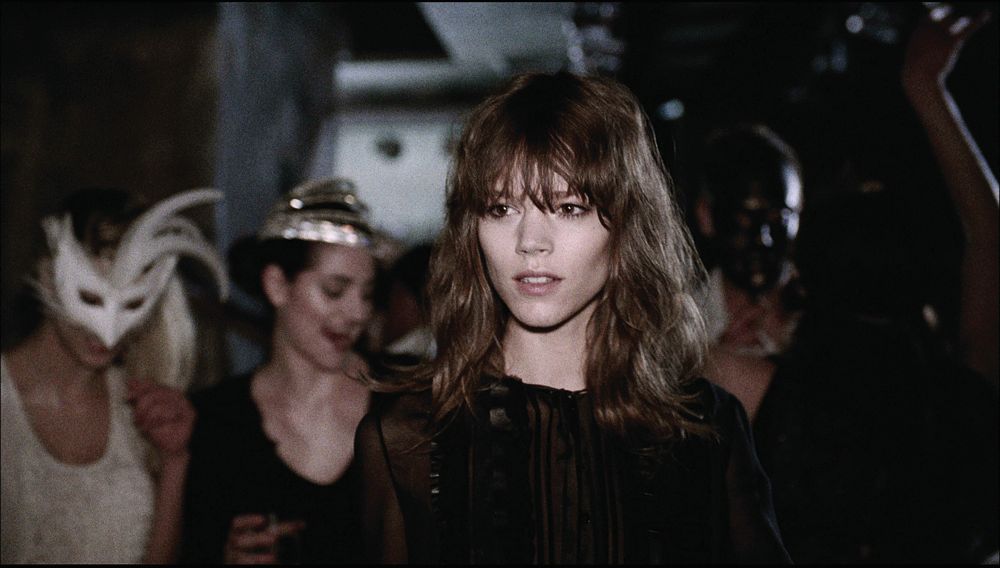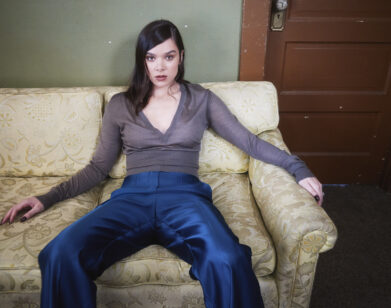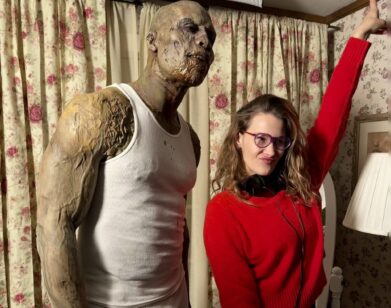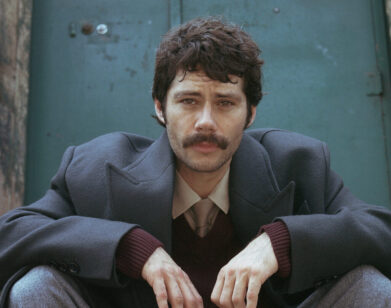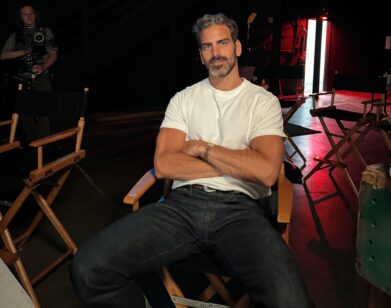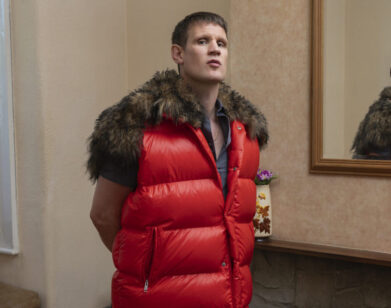Johan Renck
I think the interest in film is really about the fashion world finding another form of expression Johan renck
In 1994, a young Swedish musician by the name of Stakka Bo released a self-directed video for his dance-rap single “Here We Go,” which, despite its stark simplicity and low-budget production values, became a buzz-bin staple on MTV Europe. Unfortunately, “Here We Go” would prove Stakka Bo’s musical peak, but the track’s lo-fi video would provide the springboard to a very fruitful career as a filmmaker. Over the past decade-plus, Johan Renck (as Stakka Bo was born and is currently known) has become a prolific director, creating taut, stylized clips for the likes of Madonna (“Nothing Really Matters,” “Hung Up”), New Order (“Krafty,” “Crystal”), Kylie Minogue (“Love at First Sight”), the Knife (“Pass This On”), Beach House (“Wild”), and Bat for Lashes (“Daniel”), helming episodes of Breaking Bad and The Walking Dead, and even venturing into feature territory with the dark psychological drama Downloading Nancy (2008). The 46-year-old Renck has also emerged as a voraciously in-demand commercial director—particularly in the burgeoning subfield of fashion filmmaking, having crafted a host of coolly striking clips and shorts for brands ranging from Armani, Fendi, Givenchy, and Valentino to Nike, Levi’s, Agent Provocateur, and H&M.
Robyn, Renck’s longtime friend and sometime collaborator (he directed the video for her song “Handle Me” and shot the packaging for her 2010 album Body Talk), recently caught up with him in Gothenburg to discuss his journey into film, his forays into fashion, and the benefits of being Swedish.
ROBYN: Tell me a little bit about your life growing up. I know that you’re Swedish, but you’ve spent time all over the place.
JOHAN RENCK: I grew up all over the world. My dad was a doctor, but not a career-type doctor. He was very curious, so he took the whole family and moved to Miami in the ’70s, and we lived there for a couple of years. Then we continued like that and lived in various places around the world. It was a bit like being in a carnival or a Gypsy camp, moving around. I’m still slightly nomadic—not literally, but mindset-wise. I didn’t really move to Stockholm until the ’80s, actually, and then from my late teens onward, I lived there. Music was my thing back then—heavy metal bands, trying to get that thing to work.
ROBYN: What was your first big musical experience as a kid?
RENCK: I was a huge fan of this band called Sparks. It was a pretty good inauguration to music since their music is quite complex. They were a little glammy, and me—being a kid and not really understanding the complexity of grown-up lyrics—I took the best out of it. But at the same time, it was mysterious enough and too far away from me for me to really be able to reach it. But they were my first love affair in the world of music. I loved that band.
ROBYN: I think my manager was their manager for a while.
RENCK: Yeah? I’ve actually gotten to know them over the years, by random chance, which has meant a lot to me. Every time I’m in Los Angeles I see them. They still do music, even though now they’ve maybe left the pop behind them and gotten more into art music—which is a horrible term, but actually might describe where music is headed.
ROBYN: I remember you once said to me that you thought music was the highest art form.
RENCK: I still think that. I wish I was really talented in music because then I would be doing it. I felt that I could write a decent song, but it was a big struggle. It took a lot of time and effort for me, whereas a lot of my peers and other people like you seemed to have a much easier relationship to it. But I profoundly love music, and I still dream that I might one day try to write some new songs and record something—just for myself, to see what would happen.
ROBYN: But you did make music for a while—and successfully. When I was a kid in school, I remember hearing “Here We Go” on the radio. The mid-’90s as a whole was an important time for pop culture in Sweden.
RENCK: It was pretty amazing. MTV came to Sweden in 1987, which was hugely influential. Up to that point, we’d really only had commercial TV stations for a few years, so all of a sudden we got this influx of stuff. The programmers at MTV Europe also seemed to play whatever they wanted to play. It was not until a few years later that they were only playing whatever was on their hit list—there was actually good stuff on MTV.
ROBYN: So how did you get into making films?
RENCK: I’ve always been interested in photography. I remember when I was about 14, I spent an entire summer selling lottery tickets in some little booth so I could make enough money to buy an Olympus camera. So making images has always been important to me. But the first film thing I ever directed was the video for “Here We Go,” which actually became one of the most played videos on MTV Europe in 1994. It was so weird and small and cheap and simple. I did it, though, because nobody else wanted to do it for the money, so I said, “I’d better do this myself.” Then I became kind of interested.
ROBYN: What was your first favorite movie?
RENCK: Jaws [1975]—but it became my favorite movie before I actually saw it because I was fascinated with sharks as a kid. My parents went to see Jaws when it came out, but I couldn’t go because I was too little, so when they came home, I forced my mom to tell me the whole film, from start to finish. So I really made Jaws in my head before I’d even seen it—it was a great film. [both laugh] But the actual first film I saw at a cinema was Close Encounters of the Third Kind [1977]. We were living in Norway, in Tromsø, which is very far north, and they had a huge cinema up there. I was blown out of my mind by that movie.
ROBYN: And that melody was killer.
RENCK: Yeah, it was sick. That’s good music, man—if you can talk to aliens with it.
ROBYN: So how did you get started as a filmmaker? Did somebody just see that first video you made and give you work?
RENCK: After I made that video, I did a couple of other videos for myself. Then I did some videos for a few of my friends, and friends of friends, and pretty quickly I got to do some slightly bigger videos for bigger artists and sort of got sucked into the whole thing. Then I started getting commercial offers, and commercials were a good way to pay for the music videos. You have to go out of pocket to make music videos, so we got commercials because, on the one hand, you could make money, but then you could also bank a commercial and a music video project together to use some sort of scale benefits in booking crews for more than one job—you could make deals with them. So it was a good way to make everything work out.
ROBYN: It sounds like what a lot of production companies are doing now.
RENCK: Yes, exactly. But then I started getting more and more commercial work—as well as some resources and money—and it became highly exciting to do advertising. I started working for these big brands that wanted to do different stuff and had a bunch of money to pay for it. In a way, it was like a paid film school, because it led me to get interested in other aspects of filmmaking, like actors and acting and story. When we were making music videos back in the day, we were really beginners, so it was more about ideas and technique and weird trickeries. But as you mature, both within the profession and within filmmaking, other aspects of the process start to interest you, like how the piece works or what it expresses or how it makes you feel. Now, even if I’m doing a fashion commercial, I’m interested in finding some kind of emotional takeaway or some kind of feeling that you get from it.
ROBYN: Do you think in terms of stories?
RENCK: Yeah, of course. I’m an escapist. In everything I do, I’m just trying to avoid whatever life entails and be involved in escapist activities, whether it’s writing music or directing films or taking images.
ROBYN: Obviously, you’ve worked with a lot of different fashion brands—and more and more fashion brands seem to be very interested in working with filmmakers. Why do you think the fashion world has become so interested in making films?
RENCK: I think the fashion world, while innovative, is tremendously conservative in other ways, and it has been so lost for so long in the idea of still photography and the printed image as part of its expression. There’s a mystique to still photography. Those images ask questions—and force you to ask questions—and the kind of mystery that exists around them is very hard to replicate on film because film is a narrative format. Some fashion films try to retain some of that poetic mystery, but most of the time they only end up looking like some crappy, pretentious film-school thing. So I think the interest in film is really about the fashion world finding another form of expression. So I like doing them because I think there is room to do something new. I’m also really interested in that emotional side of things. But I’ve always been infatuated by the fashion world. I mean, I grew up loving Helmut Newton, Guy Bourdin, Antonio Lopez, Jean-Paul Goude, Jean-Baptiste Mondino-guys with strong visual expressions but also sort of an edgy sense of humor. I think the French sense of humor mixed with beautiful images and the drama and mystery of it all is what’s fascinating to me.
ROBYN: In music, we’ve come back to this place where if it doesn’t feel real or authentic, then people won’t buy it. Do you think it’ll come to that in the fashion world as well—that things will have to be less glossy and more real?
RENCK: I think the fashion world is, in a lot of ways, struggling to keep that façade up. It’s all about money in the fashion world anyways—
ROBYN: But that’s what it used to be like in the music world too.
RENCK: And the music world is more vibrant than ever now. I feel like I have more, better music in my library now than I’ve ever had before, which I think is partially because people can make music on their own, so enough of them have said, “Fuck it. I’m just gonna do what I wanna do.” I do hope that something similar happens in fashion, because fashion has become quite ridiculous in certain ways. It’s mostly about brands right now, and you can’t go stretch your creativity in that environment because it becomes all about entitlement—you know: “I can have this from this brand, and I can show it off, and now everybody knows my identity.” It’s very homogenous in a lot of ways. I see on Instagram or whatever how people are posting pictures of themselves stating that they’re wearing this very mainstream but fancy big-ass fashion brand. I mean, that has nothing to do with expression—it’s just about entitlement and getting some sort of affirmation from wearing a certain brand. Maybe it’s because of how young we were, but I remember a time when fashion had more to do with self-expression and saying something about who you were through what you were wearing. But it has very little to do with expression anymore.
ROBYN: What you’re talking about reminds me of Jean-Paul Goude mixing with Grace Jones, and that whole period when street culture made its way into fashion. It’s interesting, though, because that kind of energy is back in music a lot, but it’s not really hitting hard within the broader youth culture when it comes to fashion. It’s still in an isolated bubble.
RENCK: I agree. It’s not me being nostalgic by saying it was better before, because it was kind of more interesting before. I’ve always loved Jean-Paul Goude and Grace Jones. That was such a fantastic creation. The music was great, her voice was great—it was just intriguing. But today a lot of those things seem more desperate than anything else. You know, like when Lady Gaga is like, “Hey, I’ll make a suit out of beef, out of lamb chops.” It’s like, “Who the fuck cares?” You’re looking for shock value, but you’re not looking for expression. But I can totally see how what you’re talking about will happen again in fashion. There are some people who actually do interesting stuff. I would love to see more of that—and less of this brand-centric, entitlement-affirmation stuff.
ROBYN: I know that you still enjoy taking pictures. Where does it fit in for you now?
RENCK: This Instagram thing has been really interesting for me because it involves something that I’ve always liked in photography, which is the experience of sharing it.. I like the fact that I take all these shitty pictures with my iPhone, but then you can fiddle with them a little bit in the software and you can publish them. At times I get obsessed with it. I just sort of wander around and see what kind of pictures I can take because I feel like I have six people waiting to look at what comes out.
ROBYN: When I go to the U.S. and people find out that I’m Swedish, a lot of them almost get a little tear in their eye. They’re like, “Sweden seems to be like the perfect country.” Sweden seems to have a very good reputation at the moment around the world. Why do you think there is this image of Sweden that exists?
RENCK: Well, I think there’s some truth to it. Somebody once said that the ideal size of a country for democracy to work is around 10 million people—and that kind of makes sense if you think of it in very crude terms. In a smaller country, I guess it’s easier to maintain some kind of common ground. I do think the Swedish system of government works really well. Obviously, everything doesn’t work perfectly, but I like the principle of it. But I think one big reason why Sweden might have a good reputation around the world is that if you look at Norway or Denmark or Finland, any of the Scandinavian countries, they all seem less interested in being a part of the larger world, where Sweden has always tried to reach out, whether it’s with Volvos, Saabs, H&Ms, music, clothes—
ROBYN: ABBA.
RENCK: ABBA . . . [laughs] We’ve always created stuff to go beyond our Swedish borders. I think we’ve always wanted to be noticed—to be known outside of Sweden.
ROBYN: Do you think being Swedish is a good thing at the moment when it comes to getting work? Sometimes, when I get insecure, I think, Oh, people only think I’m cool because I’m Swedish . . .
RENCK: [laughs] I don’t know. Do people think Swedes are cool? I think they think you’re cool in spite of you being Swedish. But the good thing with being Swedish is that we’re melancholic. I think that my musical taste is derived from old, sad 18th-century Swedish folk songs and Jan Johansson. All of that kind of depressing and sad but beautiful stuff that we grew up with—that really formed me. I don’t think I have one song out of the 45 billion songs on my computer that’s not in a minor scale. So that’s my Swedishness.
ROBYN IS A GRAMMY-NOMINATED POP STAR AND FOUNDER OF KONICHIWA RECORDS.

